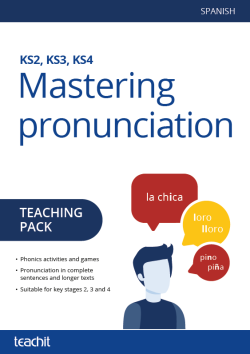Mastering pronunciation – Spanish

Mastering pronunciation – Spanish offers research- and evidence-based approaches to teaching phonics and pronunciation skills at key stage 2, key stage 3 and key stage 4 and is suitable for any exam board.
The pack is also useful for supporting non-specialists' own pronunciation when teaching Spanish in primary schools.
What's included?
This engaging pack includes:
- PowerPoints of pronunciation guidance and phonics games
- embedded audio files of words, sentences and longer texts spoken by native speakers
- printable phonics posters and photocopiable pronunciation games.
The resources draw on:
- research into best practice by NCELP and the Teaching Schools Council
- a visual-auditory-kinaesthetic (VAK) approach, associating each sound with a word, an image and a gesture
- examiner reports from GCSE listening papers
- Spanish primary school phonics textbooks.
The sound–spelling correspondences (SSCs) covered are those listed in the 2024 GCSE curriculum as presenting the greatest challenge for students of Spanish.
No assumptions are made about vocabulary knowledge, and English translations are provided throughout to maximise understanding and assist with vocabulary acquisition. Words from the pack grouped by the following themes/topics are provided as cut-out cards:
- Natural world
- Food and drink
- Home
- Town, region and country
- Describing people
- Clothes and accessories
- Travel and tourism
- School and sports.
What’s inside?
This teaching pack consists of four PowerPoint presentations and a 73-page Word document.
Introduction
10 tips for mastering pronunciation
Simple vowels (PowerPoint 1)
- [a]
- [e]
- [i]
- [o]
- [u]
Consonants (PowerPoint 2)
- [ll]
- [ch]
- [z]
- [j]
- [ñ]
- [v]
- [-r-] [-r] or [soft r]
- [rr] [r-] [-r-] or [hard r]
- silent [h]
Blends and stressed syllables (PowerPoint 3)
- [ca, co, cu]
- [ce, ci]
- [ch] (recap)
- [que, qui]
- [ga, go, gu]
- [ge, gi]
- [gue, gui]
- [güe, güi]
- Stressed syllables: general information
- Stressed syllables: rule 1 – stress on penultimate syllable
- Stressed syllables: exceptions to rule 1 (tilde)
- Stressed syllables: rule 2 – stress on last syllable
- Stressed syllables: exceptions to rule 2 (tilde)
Additional activities (PowerPoint 4)
- las ‘palabras invariables’
- longer words and cognates challenge
- cognate sentence challenge
- trabalenguas (tongue-twisters)
- longer texts
- vocabulary cards for bingo, snap, dominoes and further games
View all our secondary MFL teaching packs.
One of the pronunciation tips:
Use regular retrieval. Regularly revisiting individual SSCs or groups of SSCs and integrating them into every lesson will help embed this learning into students’ long-term memories. In reading and writing tasks, ask students to identify SSCs, stressed syllables, and soft and hard versions of consonants.
